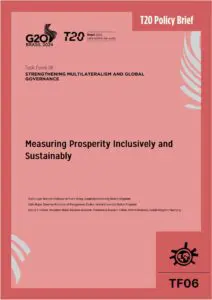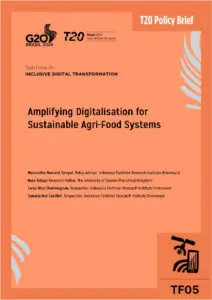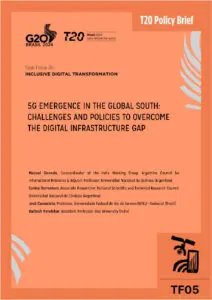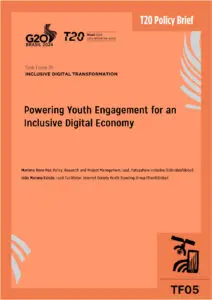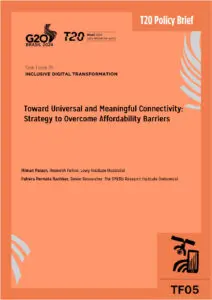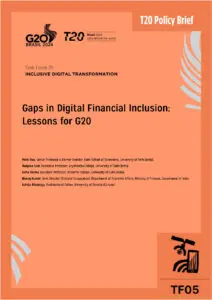In recent years, the multilateral world order has come to suffer from the resurgence of protectionism and great power rivalry that have fostered divergence and fragmentation in the global arena. Nonetheless, the growing interconnections between world economies and emerging global challenges, among which the COVID-19 pandemic, prove the need to enhance international cooperation to tackle common global challenges, thus making rival powers in certain areas strategic partners in many others. Addressing issues such as the COVID-19 pandemic, climate change or the fight against tax evasion, requires collective action and provides benefits for all participants. However, to foster action in this direction, rather than only focusing on the advantages of international cooperation, attention should be also posed to the costs of non-coordination. The lack of an unambiguous definition and specific assessment of the “costs” (not only economic) of global inaction in the face of common challenges may lead to sub-optimal policy decisions. We suggest calling on G20 leaders to set up an open and inclusive platform to share information and evidence on the costs of non-coordination, offering a bottom-up, flexible and open approach to multilateralism. In particular, we believe efforts should be devoted towards exploring avenues for the development of a comprehensive index on the costs of non-coordination. This approach could serve as a basis for identifying open “fit for purpose” forms of international cooperation, anchored to specific and practical issues. While international relations remain complex and often determined by national circumstances, providing more tangible information about the costs of non-coordination can yield more informed, transparent and accountable policy decisions.
Challenge
Despite the growing challenges faced by the multilateral system in recent years, the deep interconnectedness of our economies and the global challenges they face demonstrate that while countries may have diverging interests in certain areas, they (should) remain strategic partners in most others. Rising tensions and antagonism at the international level have fueled the perception that multilateralism is no longer a positive-sum game and has resulted in increasing divergence and fragmentation in the global arena. Nonetheless, collective action remains in many cases a necessity that also provides clear benefits for all participants, such as in managing the COVID-19 pandemic, tackling the global environmental challenge or fighting against profit shifting and tax evasion. However, to stimulate action on these crucial issues, in addition to identifying the advantages of international cooperation, attention should be also posed to the costs of non-coordination. The lack of an unambiguous definition and specific assessment of the “costs” of global non-coordination for each actor may lead to sub-optimal decisions that impact on everyone’s well-being.
The outbreak of the COVID-19 pandemic and the management of the sanitary crisis offers a good example of the magnitude of the costs of non-cooperation. Initially, the lack of a collective and coordinated response led to the adoption of inefficient sanitary measures and a misallocation of global medical resources. The discovery and rollout of the vaccine provide a definitive solution to the pandemic, and further coordination is needed to ensure a fair, equitable and broad-based vaccination globally. Instead, so-called “vaccine nationalism” has hampered the effectiveness of the global response, leading to delays in vaccinations and the emergence of new variants. In that regard, in addition to cooperation within the framework of COVAX and ACT-A, the reduction of, for example, trade tariffs on vaccines which currently stand at 0.76% on average could lead to reducing the cost of vaccine acquisition for least developed and developing countries thereby facilitating global access to vaccines. Inaction on this issue can be incredibly costly for countries all over the world, from developing economies to developed ones. According to the National Bureau of Economic Research if the global vaccination campaign is not carried out thoroughly also in developing countries, the global economic cost could amount to US$ 4 trillion (National Bureau of Economic Research 2021). This research provides an interesting example proving the usefulness of measuring the costs of international inaction on specific issues and demonstrating the severe impact that non-cooperation in managing the pandemic could have.
Environmental degradation and climate change are also amongst the most representative examples of the collective action imperative. Crucial global resources continue being depleted, waste volumes are escalating, pollution is increasing, ecosystems are being destroyed and we are collectively failing to reach the Paris Agreement objectives. According to the World Health Organization, air pollution kills 7 million people each year with a global economic impact of around US$ 225 billion in lost labor (WHO data 2019). Plastic pollution instead costs approximately US$ 13 billion in economic damage to marine ecosystems per year, as reported by the United Nations Environment Programme (UNEP 2014). Despite some progress at the international level, our collective response is too weak and much more remains to be done to achieve concrete results. According to the OECD, if no major actions are taken to address this issue, by 2050 global greenhouse gas emissions could increase by 50%, terrestrial biodiversity could decrease a further 10% and air pollution could become the world’s top environmental cause of premature mortality (OECD 2012).
Moreover, also in the area of tax evasion, base erosion and profit shifting, the costs of inaction are clearly evident as well as the benefits of global coordination. According to OECD calculations, before the advent of the COVID-19 emergency, base erosion and profit shifting practices cost countries approximately US$ 100-240 billion in lost revenue every year, which amounts to around 4-10% of global corporate income tax revenue (OECD, 2021). In addition, according to a report by The Tax Justice Network, tax evasion at the global level cost governments across the world around US$ 430 billion annually (Cobham et al. 2020).
International cooperation and collective action are the only means to concretely address these issues, most importantly in the presence of strong externalities, free riding and beggar thy neighbour incentives. International organizations and institutions have a major role to play in building trust, reducing transaction costs and supporting the implementation of collective commitments. G20 countries and the OECD have put in place cooperation initiatives to tackle these challenges and achieve positive results. The Global Forum on Transparency and Exchange of Information for Tax Purposes, for example, that brings together over 160 jurisdictions with the aim of improving transparency and the exchange of information for tax purposes, contributed to secure more than 107 billion dollars in tax revenue among members of the Forum since its launch; and in 2019, countries automatically exchanged information on 84 million financial accounts worldwide, covering total assets of EUR 10 trillion (Manatta et al. 2020). Another interesting initiative is the G20/OECD Inclusive Framework on Base Erosion and Profit Shifting. Members of this initiative are sharing information and best practices regarding fiscal policy and tax administration measures, contributing to the development of a more coherent and transparent system.
However, in the last years, the acceleration of globalization and digitalization have brought new challenges to the fore, highlighting the weaknesses of international corporate income taxation schemes. Much like it has been the case on previous tax issues, only international coordination on this matter will allow to adjust to the evolving circumstances and put governments in the conditions to avoid significant revenue losses, while avoiding the escalation of tensions and distortions through unilateral measures. The recent G7 agreement, supported by the OECD, is a good step in that direction.
Examples like the ones presented above could also be found in other areas such as trade or international migration. The lack of the development of common instruments and policies to address these global challenges, will lead to a continuous increase of the economic, environmental and social costs for all. The challenge today is thus to systematically shed light on the cost of the erosion of multilateralism to foster dialogue on specific practical issues and enhance international cooperation.
Proposal
INTRODUCTION
Instead of focusing only on “top-down” reforms that seek to tackle the structural weaknesses of the current multilateral system, we suggest leveraging the opportunities for cooperation offered by fit for purpose responses to particular issues. The advantages of such cooperation can be better showcased by focusing on the costs of sub-optimal international cooperation, or in other words by demonstrating the cost of the counter-factual to coordinated action.
Our central assumption is that the absence of common action at the global level may not only reduce the efficiency of public policies but also lead to net losses for the global community, affecting well-being and economic outcomes. In that regard, more attention should be devoted to the collection and analysis of relevant data on the cost of non-coordination and non-cooperation. Tangible and transparent information about the cost of non-coordination is likely to contribute to breaking deadlocks in different policy areas and to better inform multilateral decision-making. Governments tend to operate with limited information which, if available, could foster pragmatic mutually-beneficial action. Providing in-depth data and analysis on the cost of non-cooperation to decision-makers might not be enough in itself, but making this information easily available could contribute to better inform the public debate, build incentives for cooperation and increase the accountability and transparency of policy choices. Such a pragmatic approach could facilitate the development of open “fit for purpose” platforms devoted to enhance cooperation and coordination on specific issues.
A similar approach is applied at the European Union level with a focus on the costs of non-Europe. This concept emerged in the mid 1980s, when the Albert-Ball and Cecchini Reports of 1983 and 1988, sought to quantify the potential economic benefits of a single market in the European continent (Dunne 2014). Later, a specific unit was created in the European Parliamentary Research Service, the European Value Added Unit, whose main function is to analyze the potential benefits of common action by regularly providing “Cost of Non-Europe Reports” in policy areas where major results could be achieved through coordination. The reports systematically provide to the general public and decision makers accurate data and analysis on the eventual gains and losses of European integration in different sectors. Even if some elements of the methodology can be perfected, this approach provides interesting insights on how to foster evidence based policy-making, increasing transparency and accountability.
In addition, the G20 provides the ideal framework to mainstream discussions on the costs of non-cooperation. As demonstrated by its track-record, the G20 offers enough flexibility, legitimacy and capacity to pragmatically build fit-for-purpose open platforms, which by allowing for broad-based country engagement and leveraging the capacities of relevant international organizations can tackle major global governance issues, as demonstrated by the success of initiatives among which the Global Forum on Transparency and Exchange of Information for Tax Purposes or the Inclusive Framework on BEPS. In that regard, integrating the cost of inaction in the G20 discussions could further support the G20 efforts to kick-start innovative solutions to global challenges that could then be joined by the rest of countries of the global community.
RECOMMENDATIONS
Rather than concentrating only on the potential benefits of common action in a specific field, we believe that a focus on the costs of not implementing specific policies can be more impactful in influencing international decision-making.
We call on G20 leaders to set up an open and inclusive platform to share information and evidence on the costs of non-coordination. The aim of this initiative should be to provide in-depth analyses on the costs of inaction on key global issues in order to stimulate the international debate. In particular, efforts should be devoted to exploring avenues for the development of a comprehensive index on the costs of non-coordination. Having a specific index that can measure the costs of non-cooperation on specific issues could be crucial in orienting global decision making and on breaking delicate deadlocks in the international agenda. The aim of this paper is not to theorize such a complex indicator or suggest a specific methodology, but rather to stress the need to develop such an instrument at the international level. This paper represents an invitation to G20 countries to organize an expert panel that could develop this methodology.
As the European Parliament has done by setting up a specific unit to measure, monitor and analyze the costs of non-Europe, G20 countries could take the initiative to evaluate more systematically the cost of inaction to underpin their collective responses. To date, no structured methodology to comprehensively measure these costs has been developed. Although quantifying the specific costs of inaction appears to be particularly difficult from a practical point of view, it is necessary to provide leaders and governments with strong evidence-based information that stress the need for cooperation on specific issues. The purpose of this indicator would not be having every country agree on a common policy agenda, but its rather about developing an instrument that can support decision makers, inform the general public and increase the accountability of the global governance system.
When it comes to the definition of the costs of non-coordination, the starting point can be the identification of economic costs. It is indeed a measure traditionally used, for example in the area of trade, where calculations on the impact of tariffs have been used to showcase their damaging potential and prove the need to enhance a cooperative approach. Yet, we believe it is important to expand the definition of costs to include the social and environmental dimensions together with the concept of well-being, using more comprehensive measures, directly connected with the UN Sustainable Development Goals (SDGs). In this respect again, the “Cost of Non-Europe” approach offers interesting insights. The work that has been done around this concept is not limited to the consideration of economic indicators, on the contrary it also encompasses more political, strategic and also environmental dimensions. Reports have been developed with regards to the costs of non-Europe in the defense sector and in the area of migration, by focusing both on quantitative dimensions and on more qualitative aspects, among which operational shortcomings (Ballester 2013; Van Ballegooij and Thirion 2019). Although often difficult to measure quantitatively, evidence on the potential losses derived from inaction or non-coordination on a specific issue could prove to be crucial in providing more accurate and transparent decision making at the international level.
G20 countries should work together to develop a methodology to assess more systematically the cost of non-cooperation, considering the possibility of developing an index that is capable of providing evidence-based relevant information to decision-makers and increasing the transparency of the global governance system. This approach could serve as a basis towards identifying open “fit for purpose” forms of international cooperation, anchored to specific and practical issues. Relevant international organizations should be involved to reinforce the multilateral dimension of the process and increase its impact. As demonstrated by other initiatives like the Global Forum on Tax Transparency, IO’s participation is crucial in order to provide countries with a leveled playing field for cooperation and the institutional mechanisms for coordination. The increasing interconnectedness of our economies, the daunting climate and environmental challenges, the pervasiveness of the digital transformation and the increasing levels of mobility across the world require common action and coordination. On many issues, only global cooperation can provide concrete and positive results. The aim of our approach is to remind decision-makers of this important assumption by providing hard evidence on the costs of international inaction. With relevant information at the table, leaders could be pushed to give greater attention to global cooperation.
CONCLUSION
To sum up, while we are experiencing severe global challenges such as the Covid-19 pandemic and climate change that would require more international cooperation, we are witnessing an increase in tensions between world powers and less coordination. Often in fact governments lack in depth knowledge on the costs of non-cooperation, operating their strategic choices not on the basis of evidence but rather following narrow political interests. On the contrary, effective global governance should require focusing on the costs of non-cooperation between states and on transparently presenting these elements to the leaders and to the general public. We suggest the systematization of a new paradigm to measure the costs of non-coordination, exploring avenues towards the development of an index that is able to capture this complex dynamic. With this kind of information available, governments could be able to overcome differences and divergences and cooperatively address common issues.
REFERENCES
Ballester B., “The cost of non-Europe in Common Security and Defence”, European Parliamentary Research Service, 2013
Cobham A. et al., “The State of Tax Justice 2020”, Tax Justice Network, 2020
Dunne J., “Mapping the cost of non-Europe 2014 – 2019”, European Parliamentary Research Service, 2014
Manatta Z. et al., “OECD Global Forum outlines what’s next in the tax transparency revolution”, International Tax Review, 2020
National Bureau of Economic Research, “The Economic Case for Global Vaccinations: An Epidemiological Model with International Production Networks”, 2021
OECD, OECD Environmental Outlook to 2050: the consequences of inaction, OECD Publishing, 2012
OECD, “Going for growth 2021: Shaping a vibrant recovery”, in Chapter 2, 2021
UN Environment Programme (UNEP), “Valuing Plastic: The Business Case for Measuring, Managing and Disclosing Plastic Use in the Consumer Goods Industry”, Document Repository, 2014
Van Ballegooij W. and E. Thirion, “The cost of non-Europe in the area of legal migration”, European Parliamentary Research Service, 2019
World Health Organization data: https://www.who.int/health-topics/air-pollution#tab=tab_1



